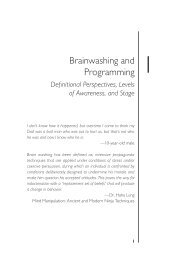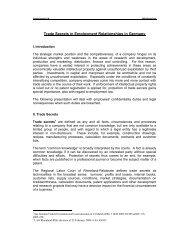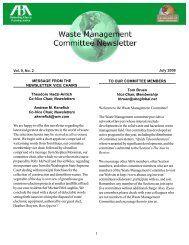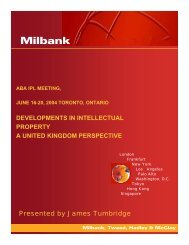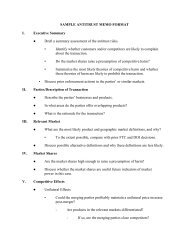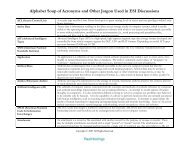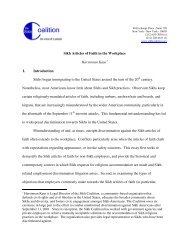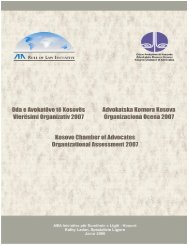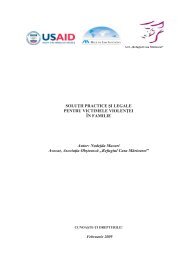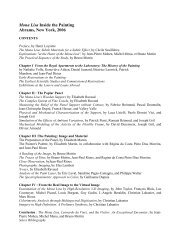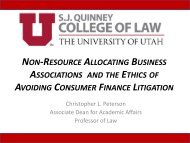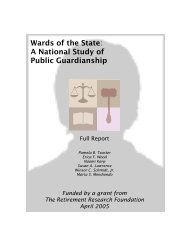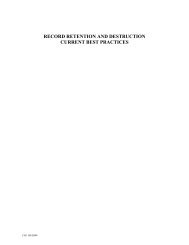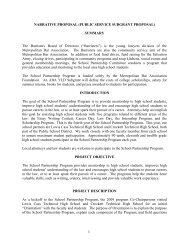Model Closing Opinion Letter (Annotated) - American Bar Association
Model Closing Opinion Letter (Annotated) - American Bar Association
Model Closing Opinion Letter (Annotated) - American Bar Association
Create successful ePaper yourself
Turn your PDF publications into a flip-book with our unique Google optimized e-Paper software.
2 <strong>Model</strong> <strong>Closing</strong> <strong>Opinion</strong> <strong>Letter</strong> (<strong>Annotated</strong>)<br />
(b) breach or result in a default under any Other Agreement listed<br />
in the Company’s Certificate, or (c) result in a violation of any<br />
Court Order listed in the Company’s Certificate.<br />
Note: (a) See Tri<strong>Bar</strong> Report § 6.5. “Company’s Certificate” is defined<br />
in paragraph (B)(3), p. 95, below. Other commonly used approaches<br />
to identify which contracts and court orders the <strong>Opinion</strong><br />
Preparers will be expected to review are to limit the <strong>Opinion</strong> to the<br />
items listed in a filing by the Company with the Securities and Exchange<br />
Commission or in an attachment to the <strong>Opinion</strong> <strong>Letter</strong>. See<br />
Tri<strong>Bar</strong> Report § 6.5.5. If the <strong>Opinion</strong> does not refer specifically to a<br />
list of contracts and court orders prepared by the client, the <strong>Opinion</strong><br />
should be limited by the phrase “to our knowledge”; this term<br />
should be defined as in paragraph (G), p. 104, below. See Tri<strong>Bar</strong><br />
Report § 6.5.5; note (b) to section B, p. 92, below. The Legal <strong>Opinion</strong><br />
Committee believes it is preferable to specifically identify the Other<br />
Agreements and Court Orders covered by this <strong>Opinion</strong>.<br />
(b) A “breach” or “default” under an Other Agreement or Court<br />
Order means an act or failure that, by itself, or with the giving of<br />
notice or passage of time, or both, would constitute an event of default<br />
or other event having similar remedial consequences under<br />
such Other Agreement or Court Order.<br />
The <strong>Opinion</strong> is designed to tell whether the client’s entering into the<br />
transaction or performance of its obligations thereunder will result<br />
in a breach of or default under the Company’s other legally binding<br />
obligations. When the Other Agreements contain financial covenants,<br />
counsel should not be requested to give an <strong>Opinion</strong> as to<br />
breach or satisfaction thereof or as to violation of financial restrictions<br />
requiring interpretation of financial covenants. See ABA<br />
Guidelines 1.4. The <strong>Opinion</strong> Giver is not responsible for the resolution<br />
of any factual issue that is not readily apparent from the terms<br />
of the document being reviewed or cannot be established through<br />
certificate reliance.<br />
(c) “Conflict”; Lien Triggering, Acceleration of Debt. Adverse<br />
economic consequences not constituting a breach or default need<br />
not be considered in a “No Breach or Default” <strong>Opinion</strong>. Tri<strong>Bar</strong> Report<br />
§ 6.5.3. To avoid such an interpretation, the <strong>Opinion</strong> <strong>Letter</strong><br />
should not use language confirming that the transaction does not<br />
“conflict with” or “contravene” a Company’s Other Agreements. See<br />
Tri<strong>Bar</strong> Report § 6.5.2.<br />
84



